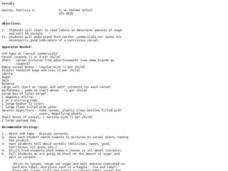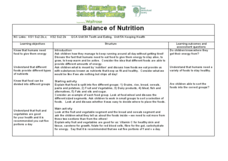Curated OER
Nutrition and the Media: Cereal Box Consumerism
How many treats do you buy each week? Learners investigate diets and how the media tricks consumers into purchasing unhealthy snacks. They will investigate the designs and logos affiliated with cereal boxes and identify specific phrases...
Curated OER
Fortified Breakfast
Students reverse engineer a cereal. In this dietary lesson students identify the minerals that the human body needs to function. Students examine how foods are fortified by food engineers. Students find the amount of iron in a cereal by...
Curated OER
Reading & Using a Nutrition Label
Students discover the importance of healthy eating. Using food nutrition labels, they read and examine the nutritional value. Students collect the data on a spreadsheet and create a graph. They analyze the media influences on product...
Curated OER
Cereals
Students watch television commercials, then analyze the nutritional value of the cereals. In this health and nutrition lesson, the teacher shows students several cereal commercials, then the students describe the cereals. Students read...
Curated OER
Reading Food Labels
Young nutritionists plan nutritional meals by using the USDA's Food Guide Pyramid. Before constructing their meal plans, they take a close look a food labels and learn how to decipher them. In today's world of obese and unfit children,...
Curated OER
Balance of Nutrition
Students explore nutrition by completing a group activity. In this balanced meal lesson, students identify the five food groups and discuss their favorite foods from each group. Students utilize illustrations to fill in a fictional plate...
Baylor College
Serving Sizes
Are serving sizes for different foods always appropriate for what you need? For this hands-on activity, learners work in groups to estimate what one serving size of various foods are, and then evaluate their hypotheses by measuring real...
Curated OER
Diet and Nutrition
Young scholars figure out the nutritional values of foods to explain the nature of a healthy diet by looking at fast food nutrition pamphlets and calculating the values of foods then comparing them to the food pyramid.
Curated OER
So Sweet
Students compare sugar levels in cereals. In this nutrition lesson, students learn how to read a nutrition facts label, predict which products will have the most sugar, discover which cereals contain the most sugar and discuss their...
Curated OER
Food Label Fun
Third graders demonstrate how to read and analyze food labels. In this nutrition lesson, 3rd graders watch a food label video and investigate labels from various canned foods. Students create a chart showing the percentage of vitamins...
Curated OER
Iron For Breakfast
Third graders are challenged to use scientific thinking, they experiment and observe which objects are attracted to a magnet. Pupils use the evidence to construct an explanation as to what common property the objects attracted to a...
Curated OER
Quick Breads, Pancake/Waffle Lab
Pupils explore the bread, cereal, grain food group on the Food Guide Pyramid. They test recipes for quick breads which are high in carbohydrates and determine the purpose of each of the ingredients in pancakes or waffles.
Curated OER
It's Sugar Time!
Fifth graders review the Food Pyramid. They examine several breakfast cereal labels and determine how much sugar is in each. They discuss these amounts and whether or not they are surprised by the results. They discuss the amount of...
Curated OER
Reading Food Labels
Fourth graders examine the food labels on two similar items that are very different nutritionally such as a can of regular soda and a can of diet soda. Next they, sort through food labels to determine healthy and unhealthy foods by...
Curated OER
Investigating the Food Pyramid
Students examine how the food pyramid is an important nutritional tool. They classify foods and compare the number of servings per group that are necessary for maintaining good health by placing empty food containers in grocery bags.
Curated OER
Fatty Food
Students explore nutrition by participating in a balanced diet activity. In this eating habits lesson, students analyze their own diets and discuss the foods they have eaten that day. Students utilize grocery bags, scissors, Ziploc bags...
Curated OER
When Something's Missing: Diagnosing Vitamin Deficiencies
The New York Times "Education" section posts an extensive lesson on vitamin and mineral deficiencies. It involves class discussion, examination of food packaging labels, and the reading of a blog post about Vitamin D. The highlight of...
Curated OER
Get Fit for Yosemite - Nutrition
Students demonstrate an understanding of healthy eating habits and of following a fitness program. They visit Yosemite Institute.
Curated OER
Optimization For Breakfast
Students identify he proportion of a cereal box. In this algebra lesson, students define the relationship between patterns, functions and relations. They model their understanding using the cereal box.
Curated OER
Energy Balance: The Ins and Outs
Pupils review data from a 24-hour dietary recall to gain an understanding of the information regarding energy intake and macronutrients.
Curated OER
Climbing the Pyramid
Students examine the Food Pyramid to discover the foods they need to eat to have a healthy body. Using food brought to class, they must place the food in the correct category in the pyramid. In groups, they test food samples for fat...
Curated OER
Measuring Lab
Students explain the importance of using standardized measuring cups and spoons by preparing a recipe using inaccurate and misunderstood measurements.
Curated OER
FAT FOLLIES
Students, testing various foods for fat content by rubbing food samples on paper. Students identify what and who the US Food and Drug Administration is in reference to the Food Pyramid. Students write the name of each food brought in to...
Curated OER
Dietary Fiber Introduction
Students identify fiber from foods, its sources and function in the body. They also the importance of fiber in the diet and good food sources that one can eat. Finally, students discuss water and its importance with eating fiber and...

























